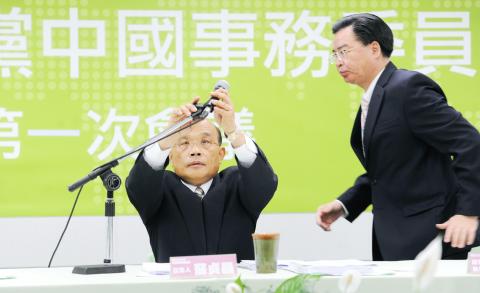The Democratic Progressive Party (DPP) took the first step toward the formulation of its cross-strait policy as its nine-member China Affairs Committee held its first meeting yesterday in the face of mounting cross-strait challenges.
“Almost every member of the committee agreed that the DPP’s core values have withstood the test of time and changing political situation. Discussions over strategic options and substantial policies are what this committee has to accomplish in the future,” committee spokesperson Cheng Wen-tsan (鄭文燦) told a press conference.
The two-hour meeting gathered all the committee members, namely committee convener and DPP Chairman Su Tseng-chang (蘇貞昌), former DPP chairperson Tsai Ing-wen (蔡英文), former premier Frank Hsieh (謝長廷), Greater Kaohsiung Mayor Chen Chu (陳菊), former premier Yu Shyi-kun, DPP legislative caucus whip Ker Chien-ming (柯建銘), Greater Tainan Mayor William Lai (賴清德), former National Security Council secretary-general Chiou I-jen (邱義仁) and former DPP secretary--general Wu Nai-jen (吳乃仁).

Photo: Lo Pei-Der, Taipei Times
Chen Ming-tung (陳明通), a National Taiwan University professor who served as Mainland Affairs Council chairman under the DPP administration, gave the keynote speech, “Taiwan’s China agenda.”
In it, he highlighted a “Taiwan Dream” based on the Taiwanese people’s high degree of consensus on sovereignty, security, human rights and economic benefits, Cheng quoted Chen as saying.
Underlining the hierarchy of the DPP’s cross-strait policy, Chiou said the party should be able to assess its basic position, strategic options and policymaking to counter persistent challenges from Beijing, Cheng said.
Former premiers Yu and Hsieh, who hold very different attitudes toward China, both laid out their main ideas in the meeting, with Yu saying that he would support any policy as long as it does not harm national interests and does not violate the DPP’s Resolution on Taiwan’s Future (台灣前途決議文) and its Normal Country Resolution (正常國家決議文).
Hsieh, who did not join the committee until this week, played down the differences between his moderate China policy and other members’ more hawkish positions, saying that the only difference between them could be his initiative of “constitutions with different interpretations (憲法各表).”
While the spokesperson said the atmosphere of the meeting was generally convivial, a DPP member who was at the meeting said on condition of anonymity that Chiou argued with Hsieh about the DPP’s attitude to the Republic of China (ROC) Constitution.
Chiou said the DPP does not accept the ROC Constitution in its entirety, while Hsieh believed the opposite, the source said.
The committee’s second meeting is scheduled for July 11, DPP Department of China Affairs director Honigmann Hong (洪財隆) said, adding that the meetings would be held every two months.

INVESTIGATION: The case is the latest instance of a DPP figure being implicated in an espionage network accused of allegedly leaking information to Chinese intelligence Democratic Progressive Party (DPP) member Ho Jen-chieh (何仁傑) was detained and held incommunicado yesterday on suspicion of spying for China during his tenure as assistant to then-minister of foreign affairs Joseph Wu (吳釗燮). The Taipei District Prosecutors’ Office said Ho was implicated during its investigation into alleged spying activities by former Presidential Office consultant Wu Shang-yu (吳尚雨). Prosecutors said there is reason to believe Ho breached the National Security Act (國家安全法) by leaking classified Ministry of Foreign Affairs information to Chinese intelligence. Following interrogation, prosecutors petitioned the Taipei District Court to detain Ho, citing concerns over potential collusion or tampering of evidence. The

NEGOTIATIONS: Taiwan has good relations with Washington and the outlook for the negotiations looks promising, Minister of Economic Affairs J.W. Kuo said Taiwan’s GDP growth this year is expected to decrease by 0.43 to 1.61 percentage points due to the effects of US tariffs, National Development Council (NDC) Minister Paul Liu (劉鏡清) said at a meeting of the legislature’s Economics Committee in Taipei yesterday, citing a preliminary estimate by a private research institution. Taiwan’s economy would be significantly affected by the 32 percent “reciprocal” tariffs slapped by the US, which took effect yesterday, Liu said, adding that GDP growth could fall below 3 percent and potentially even dip below 2 percent to 1.53 percent this year. The council has commissioned another institution

NEGOTIATIONS: The US response to the countermeasures and plans Taiwan presented has been positive, including boosting procurement and investment, the president said Taiwan is included in the first group for trade negotiations with the US, President William Lai (賴清德) said yesterday, as he seeks to shield Taiwanese exporters from a 32 percent tariff. In Washington, US Trade Representative Jamieson Greer said in an interview on Fox News on Thursday that he would speak to his Taiwanese and Israeli counterparts yesterday about tariffs after holding a long discussion with the Vietnamese earlier. US President Donald Trump on Wednesday postponed punishing levies on multiple trade partners, including Taiwan, for three months after trillions of US dollars were wiped off global markets. He has maintained a 10 percent

TRADE: The premier pledged safeguards on ‘Made in Taiwan’ labeling, anti-dumping measures and stricter export controls to strengthen its position in trade talks Products labeled “made in Taiwan” must be genuinely made in Taiwan, Premier Cho Jung-tai (卓榮泰) said yesterday, vowing to enforce strict safeguards against “origin laundering” and initiate anti-dumping investigations to prevent China dumping its products in Taiwan. Cho made the remarks in a discussion session with representatives from industries in Kaohsiung. In response to the US government’s recent announcement of “reciprocal” tariffs on its trading partners, President William Lai (賴清德) and Cho last week began a series of consultations with industry leaders nationwide to gather feedback and address concerns. Taiwanese and US officials held a videoconference on Friday evening to discuss the